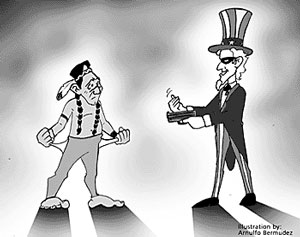I Am Indigenist
Notes on the Ideology of the Fourth World
By Ward Churchill
From the viewpoint of the indigenous nations, of course, these treaties served other purposes: the securing of permanently guaranteed borders to what remained of their national territories, assurance of the continuation of their ongoing self-governance, trade and military alliances, and so forth. The treaty relationships were invariably reciprocal in nature: Indians ceded certain portions of their land to the United States, and the United States incurred certain obligations in exchange. Even at that, there were seldom any outright sales of land by Indian nations to the United States. Rather, the federal obligations incurred were usually couched in terms of perpetuity. The arrangements were set up by the Indians so that, as long as the United States honored its end of the bargains, it would have the right to occupy and use defined portions of Indian land. In this sense, the treaties more nearly resemble rental or leasing instruments than actual deeds. And what happens under Anglo-Saxon common law when a tenant violates the provisions of a rental agreement?
The point here is that the United States has long since defaulted on its responsibilities under every single treaty obligation it ever incurred with regard to Indians. There is really no dispute about this. In fact, there is even a Supreme Court opinion, the 1903 Lonewolf case, in which the good "Justices" held that the United States enjoyed a "right" to disregard any treaty obligation to Indians it found inconvenient, but that the remaining treaty provisions continued to be binding upon the Indians. This was, the high court said, because the United States was the stronger of the nations involved and thus wielded "plenary" power—this simply means full power—over the affairs of the weaker indigenous nations. Therefore, the court felt itself free to unilaterally "interpret" each treaty as a bill of sale rather than a rental agreement.
Stripped of its fancy legal language, the Supreme Court's position was (and remains) astonishingly crude. There is an old adage that "possession is nine-tenths of the law." Well, in this case the court went a bit further, arguing that possession was all of the law. Further, the highest court in the land went on record boldly arguing that, where Indian property rights are concerned, might, and might alone, makes right. The United States held the power to simply take Indian land, they said, and therefore it had the "right" to do so. This is precisely what the nazis argued only thirty years later, and the United States had the unmitigated audacity to profess outrage and shock that Germany was so blatantly transgressing against elementary standards of international law and the most basic requirements of human decency.
No prejudice among Indians?
Only one Indian civilization?
Churchill the indigenist
Disclaimer: Nothing in this posting is meant to support any of Churchill's words or deeds except the words noted here.


No comments:
Post a Comment
Note: Only a member of this blog may post a comment.